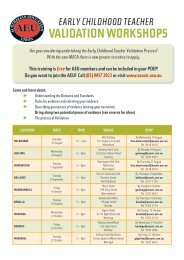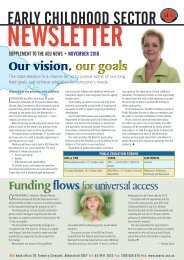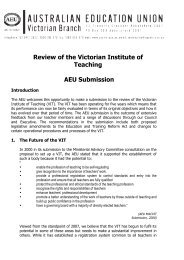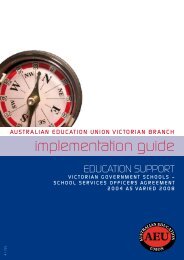One world ONE VISION One world ONE VISION - Australian ...
One world ONE VISION One world ONE VISION - Australian ...
One world ONE VISION One world ONE VISION - Australian ...
Create successful ePaper yourself
Turn your PDF publications into a flip-book with our unique Google optimized e-Paper software.
featurecontinued from p17level of satisfaction with the process were linked tothe level of leadership support for it. ACER quotedone PRT:“I didn't have a mentor and didn't have regularmeetings or progress reports with anyone onhow I was going, despite having a very heavyteaching load of VCE during my first year.“Thankfully, I had supportive staff around mewho helped me, but I think the program needs to betaken more seriously by some to support graduateteachers. I can now see why so many graduateteachers leave the profession.”The ACER report said mentors also recognisedthe critical importance of school leaders backingeffective induction programs. <strong>One</strong> mentor said:“The whole process needs to be supported bythe school leadership team, principal, vice principaletc. This was sadly lacking in our school. I felt theydid not understand the importance and relevanceof the process.“The choice of mentor was based onconvenience, rather than needs, personality,enthusiasm or suitability of the people involved.”Effective induction programs benefitted students,teachers and taxpayers, the ACER report said.“They increase retention of good teachers. Theypromote high standards of teaching and effectivehabits of ongoing professional learning. They alsohelp to guide ineffective teachers to other occupationsand minimise money that might have to bespent later on managing theirperformance.”Anecdotal evidence suggests that, six yearson, not all beginner teachers, and therefore theirstudents, are benefitting from an induction processthat experts consider vital in achieving qualityteaching and learning and in keeping good andpotentially good teachers in the profession.Mullaly says the best schools provide mentoringbeyond one year.Also, “where the ethos has colleaguessupporting each other, the school will probablyalso have induction programs of good quality andgenerous mentoring.” ◆The Education Department’s induction guide, setting outwhat it expects of school induction programs is at tinyurl.com/3z5vhvs.Details of the department’s Teacher Mentor SupportProgram are at tinyurl.com/3cad8j4.You can download the department’s leaflet Supportingyour Beginning Teachers (PDF) at tinyurl.com/4229r5k.First and last?A series of contracts and lack of support left oneyoung teacher looking for an early career change.ENGLISH teacher Sue Jonesdescribes her first — and so faronly — year in teaching as “ratherbrutal”.Sue — not her real name —was employed by a Melbourne highschool at the end of Term 1 last yearon a three-month contract to replacea teacher on sick leave.She was shown around thecampus and given a folder “with abunch of information in it about theschool”. Her first office was sharedwith teachers who didn’t teach hersubject, and she was not allocated amentor, she says, “because we don’tknow how long you’ll be here”.A group of English teachersinvited her to join them in their office— “I don’t think I would have lastedthe year otherwise”, she says — andshe was eventually given a mentor.But, as a leading teacher withother graduates to mentor, he hadlimited time to offer. “He was verybusy and he did the best he could.We sat down when we could, butadvice was generally limited to whatI should be teaching in terms of thematerial,” she says.Sue’s three-month contract wasfollowed by successive 10-weekcontracts. She worked about60 hours a week to master thecurriculum and plan her lessons.Towards the end of the year she hadto buy her own whiteboard markersbecause “my $80 stationery budgethad run out”.At the end of the year it wassuggested she apply for three,one-year positions for 2011 —timetable planners even discussedsubject placements with her. But shedidn’t get a job.“My partner was often shockedby my experience,” says Sue,26, “The office I worked in, theamount of work I had to do and theexpectations, and the fact that theschool was never straight with me.”Early this year, a friend alerted herto a job at the Justice Department.“I have a massive desk, a bigwindow, it’s centrally heated, I haveopportunities for professionaldevelopment and there arereasonable expectations about theamount of work I have to do. And Ican have as many pens as I want.”She may return to teaching “butit’s not hard to understand now whyso many people don’t stay. It is a lotof work and so much is expected ofpeople.” ◆What beginningteachers need• A choice of mentor who cansupport their professionaldevelopment• Mentors should be accessible,with time to spend with thebeginner teacher and workclose by• Formal, timetabled meetingtimes with their mentor• Opportunities to share teachingpractice, observe othersteaching and be observedteaching• Regular and supportive communicationwith the principal• Orientation of basic schoolprocesses, rules andprocedures.Source: DEECD18 aeu news | august 2011
















